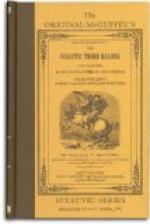Definitions.—Com-po-si’tion, that which is thought out and arranged, a written or literary work. 3. Rum’pled, wrinkled, creased. Themes, subjects or topics on which a person writes. 10. Re-quest’, that which is asked. 14. Oc-cu-pa’tion, that which employs the time. 20. Bou-quets’ (pro. boo-kas’), bunches of flowers.
Exercises.—What is a composition? Why was Susie so troubled? Why could she not write about “Time,” “Temperance,” or “Industry”? What did her mother have her do? What did Susie write? Was it a composition? Did she know, at the time, that it was? What fault did she find with it? Can you give her composition a proper subject?
XXXVIII. THE SUMMER SHOWER. (109)
The author, Thomas Buchanan Read, was born in Chester Co., Pa., March 12, 1822. His life was devoted to the fine arts, and he attained a high reputation both as artist and poet. He died in New York, May 11, 1872.
1. Before the stout harvesters falleth the grain,
As when the strong stormwind is
reaping the plain,
And loiters the boy in the briery
lane;
But yonder aslant comes the silvery
rain,
Like a long line of spears brightly burnished and
tall.
2. Adown the white highway like cavalry fleet,
It dashes the dust with its numberless
feet.
Like a murmurless school, in their
leafy retreat,
The wild birds sit listening the
drops round them beat;
And the boy crouches close to the blackberry wall.
3. The swallows alone take the storm on the wing,
And, taunting the tree-sheltered
laborers, sing.
Like pebbles the rain breaks the
face of the spring,
While a bubble darts up from each
widening ring;
And the boy in dismay hears the loud shower fall.
4. But soon are the harvesters tossing their
sheaves;
The robin darts out from his bower
of leaves;
The wren peereth forth from the
moss-covered eaves;
And the rain-spattered urchin now
gladly perceives
That the beautiful bow bendeth over them all.
Definitions.—l. A-slant’,
toward one side. 2. High’way, a public road.
Re-treat’, a place of refuge or safety, Crouch’es,
stoops low. 3.
Taunt’ing, deriding, mocking. 4. Ur’chin,
a child.
XXXIX. CONSEQUENCES OF IDLENESS. (110)
1. Many young persons seem to think it of not much consequence if they do not improve their time well in youth, vainly expecting that they can make it up by diligence when they are older. They also think it is disgraceful for men and women to be idle, but that there can be no harm for persons who are young to spend their time in any manner they please.
2. George Jones thought so. When he was twelve years old, he went to an academy to prepare to enter college. His father was at great expense in obtaining books for him, clothing him, and paying his tuition. But George was idle. The preceptor of the academy would often tell him that if he did not study diligently when young he would never succeed well.




